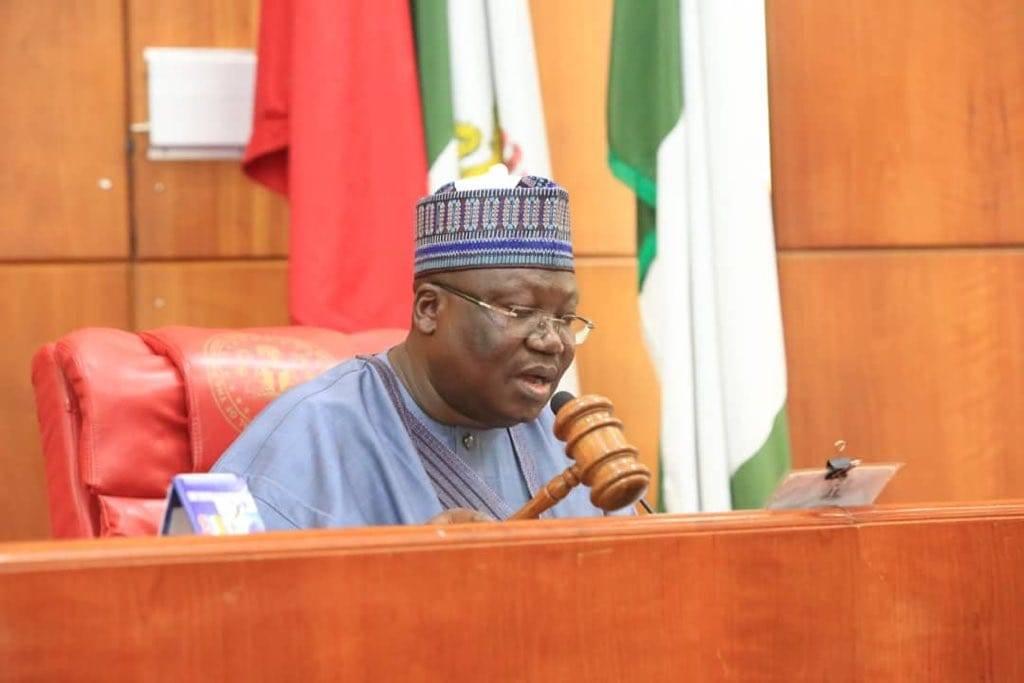
Ahmed Lawan, SenatePresident
By Braeyi Ekiye
The race for the next senate president has begun in earnest even before the inauguration of distinguished members of the 10th National Assembly.
It is no secret that interested candidates for the top job have started intense lobby with three months away from the inauguration of members of the Red Chamber. A senate which presents itself as a potentially diverse congregation of professionals, academicians, technocrats and enterprenuers.
It is speculated that the choice of the next senate president would largely depend on the zoning of the office, among other principal offices, by the leadership of the ruling All Progressives Congress (APC) which so far has clinched 57 seats, with the People’s Democratic Party (PDP) making do with 29, while the Labour Party managed to coast home with 6 members. New Nigeria Peoples Party (NNPP) and the Social Democratic Party have 2 members each while All Progressives Grand Alliance (APGA) and Young Peoples Progressive Party (YPPP) have one member each.
Certainly, there would be a lot of horse-trading in the process leading to the choice of the senate president, with the multi-party representation in the senate this time around. It would therefore not be business as usual. It would not be “winner takes all” as hitherto played out in previous allocation of senate leadership and other principal offices.
Presently, the top contenders for the hot seat are the current senate president, Ahmed Ibrahim Lawan (Yobe North), Ali Ndume (Borno South), Akpabio Godswill (Akwa-Ibom North), Orji Uzoh Kalu (Abia North), Jibrin Barau (Kano-North), and Mohammed Sani Musa (Niger-East).
In the third republic which has had uninterrupted democratic rule for twenty-four years (1999-2023), the North Central, the North East, and South West have had at one time or the other senate presidents in the course of Nigeria’s new democratic experience.
From the foregoing, it is only the North West and the South-South that is yet to have their senators elected as senate president. It would therefore be instructive that as a matter of equity and justice, these two geo-political zones should be considered for the next president of the senate. Going further, it would even be more appropriate for the South-South and the North-West to synergize and work towards producing the next president of the senate amongst their distinguished members. Most senators from these geo-political zones are eminently qualified for the presidential seat. They include Senator Seriake Dickson of Sagbama-Ekeremor Senatorial District of Bayelsa State, Godswill Akpabio, Akwa-Ibom North, Uba Sani (Kaduna Central), Ahmed Babba Kaita (Katsina North), just to mention a few.
It would be recalled that Dr. Joseph Wayas from Obudu in the old Cross River State held sway as president of the senate in the second republic presidential democratic experience, and creditably acquitted himself during his tenure from 1979-1983. Thereafter, there has been others from the Northern block, the likes of David Mark, Ameh Ebute, Iwaye Iyorcha Ayu, Bukola Saraki and Ahmed Ibrahim Lawan. There are those for the South-East who superintended over the senate; Adolphus Nduneweh Wabara, Evan Enwerem, Pius Ayim, Chuba Wilberforce Okadigbo and Ken Nnamani.
From the South-West was Patricia Olubunmi Foluke Etteh, a Yoruba who also was one-time senate president.
From the foregoing, one is tempted to amplify House of Representative member, representing Sagbama/Ekeremor Federal constituency, Fred Agbedi’s call for equity and justice to prevail in the choice of the next president of the Senate to come from zones that are yet to be in the commanding height of the senate. And these are obviously the South-South and the North-West geo-political zones.
What, I think should be the lead to a choice from those zones, is predicated on their power of cohesion, articulation, display of brotherhood, sincerity of purpose and intense lobby of other geo-political zones and party leaderships to bring to fruition their desire for the seat of the 10th senate presidency. Their commitment towards this goal should be undiluted in their search for a common ground and purpose and dedication to the common good of the nation. The common good of enthroning a just, equitable and an egalitarian society where peace and harmony, security and prosperity abound.
- Braeyi Ekiye, Publisher of EnvironmentWatch writes from Yenagoa.
Disclaimer
Comments expressed here do not reflect the opinions of Vanguard newspapers or any employee thereof.